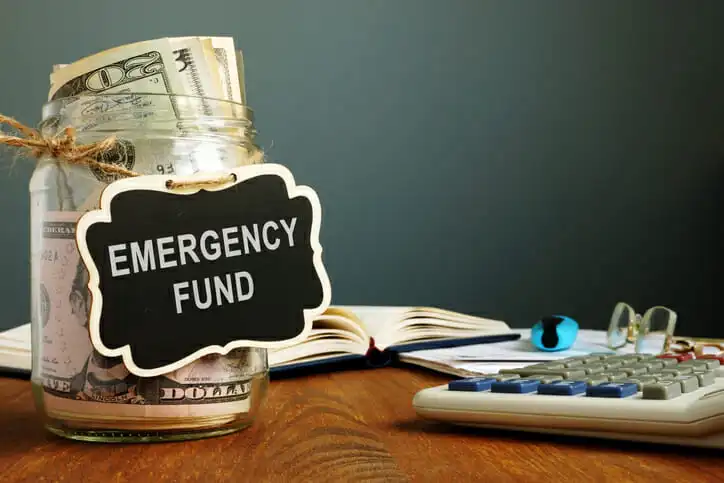Life can throw your curveballs. Whether it’s a surprise expense, sudden job loss or unexpected opportunity, having quick access to cash is key. An emergency fund protects you from the unexpected so you don’t have to go into debt. Let’s break down how much you should have for your situation and how to get started. A financial advisor can help you lower your taxes by optimizing your investments with a tax plan.
Five Reasons to Have an Emergency Fund
An emergency fund is a financial safety net set aside to cover unplanned expenses or financial emergencies. While many investors focus on maximizing their returns, an emergency fund should be in low-risk accounts that provide easy liquidity. There are many different types of financial emergencies that occur. While many households cover small unexpected bills through your regular paycheck, others overwhelm your finances and require tapping into your emergency fund.
Here are five common reasons to have an emergency fund:
- Medical or dental emergency
- Job loss
- Unexpected home or appliance repairs
- Car repairs or accident
- Unplanned travel expenses (e.g.: funeral)
Where Should You Keep Your Emergency Fund?
Investors need their emergency funds to be readily available when disaster strikes. Because of this, the accounts need to be fairly liquid and low-risk.
A few of the most common accounts for your emergency fund include:
- Checking accounts
- Savings accounts
- Money market accounts
- Short-term CDs (including CD ladders)
- Prepaid cards
- Short-term government bonds
- Cash in a secure location
While you may feel that you’re missing out on stock market gains, emergency fund money should not be invested in high-risk investments.
How Much of an Emergency Fund Should I Have?

Many experts recommend that you have three to six months of monthly expenses in your emergency fund. While this generic advice makes sense for some investors, other situations require different recommendations. Here’s how much emergency fund you should have based on four common situations:
- Stable career with low debt. Three to six months is a reasonable recommendation for households that have stable careers and small amounts of debt.
- Irregular paychecks or income. People who have irregular paychecks should have at least six to 12 months of expenses in their emergency fund. Many salespeople or seasonal workers fall into this category.
- Self-employed or business owners. Business owners’ income can fluctuate widely based on conditions outside their control. An emergency fund of one to two years of operating expenses protects them during a recession, loss of clients or when launching a new product.
- Retirees. When you’re retired, you don’t want to sell your assets to cover an emergency during a downturn or miss out on gains when the market is booming. Having a larger emergency fund enables you to cover unexpected bills without selling your investments. Ideally, your emergency fund should cover two years of expenses.
While these rules of thumb fit many households, many investors adjust them based on their comfort level. For example, many conservative investors keep even more money liquid than what’s listed above. Discuss your situation and concerns with a financial advisor to create an emergency fund strategy that works best for you.
How to Start Building Your Emergency Fund
Starting an emergency fund can be a challenge for some people. Most people don’t have enough to fully fund their emergency fund right away. It’s OK to start small and make incremental progress towards this goal. Here are five steps:
- Open a high-yield savings account. Many online banks offer no-fee online savings accounts that offer higher interest rates than traditional banks. You can open many of these accounts with just $1 as a starting deposit.
- Start small. Open your account with the minimum deposit and start adding small amounts each paycheck or when you have extra money.
- Establish recurring deposits. Develop a regular routine by setting up recurring deposits on a schedule that you can keep. Many accounts allow deposits on a weekly, bi-weekly or monthly basis.
- Increase deposits over time. As you get a better handle on your budget, increase your recurring deposits. Also, consider bumping up this amount whenever you get a raise, promotion or new job.
- Deposit “found” money. When you receive rebates, tax refunds, an inheritance or other unexpected money, add it to your emergency fund.
Bottom Line

An emergency fund is a valuable piece of your overall financial plan. It helps to cover unexpected bills and keeps your other money invested for the long term. How much you should have in an emergency fund depends on your situation and monthly bills. Even if you don’t have all of the money right away, many accounts allow you to start small and slowly build your balance over time.
Tips for Increasing Your Savings
- Setting up automatic deposits into your emergency fund is one of the best ways to increase your savings. These recurring deposits build your balance and increase your interest income. SmartAsset’s savings calculator could show you how much your money will grow over time based on current rates.
- Financial advisors do more than evaluate your investments. Their expertise helps you find ways to trim your budget and increase savings to reach your goals. Finding a qualified financial advisor doesn’t have to be hard. SmartAsset’s free tool matches you with up to three financial advisors who serve your area, and you can interview your advisor matches at no cost to decide which one is right for you. If you’re ready to find an advisor who can help you achieve your financial goals, get started now.
Photo credit: ©iStock.com/Drazen_, ©iStock.com/ImagesRawpixel, ©iStock.com/designer491
